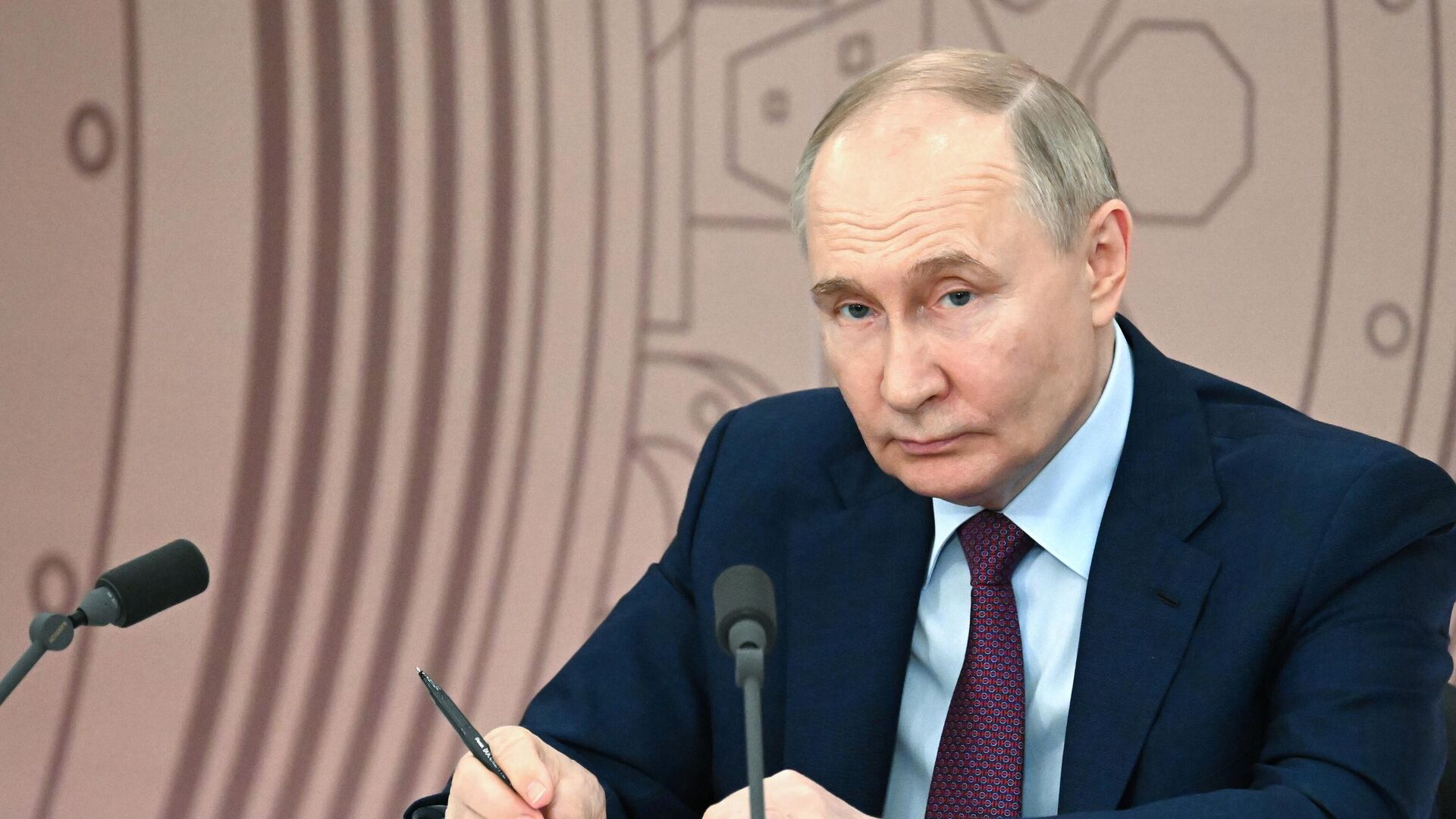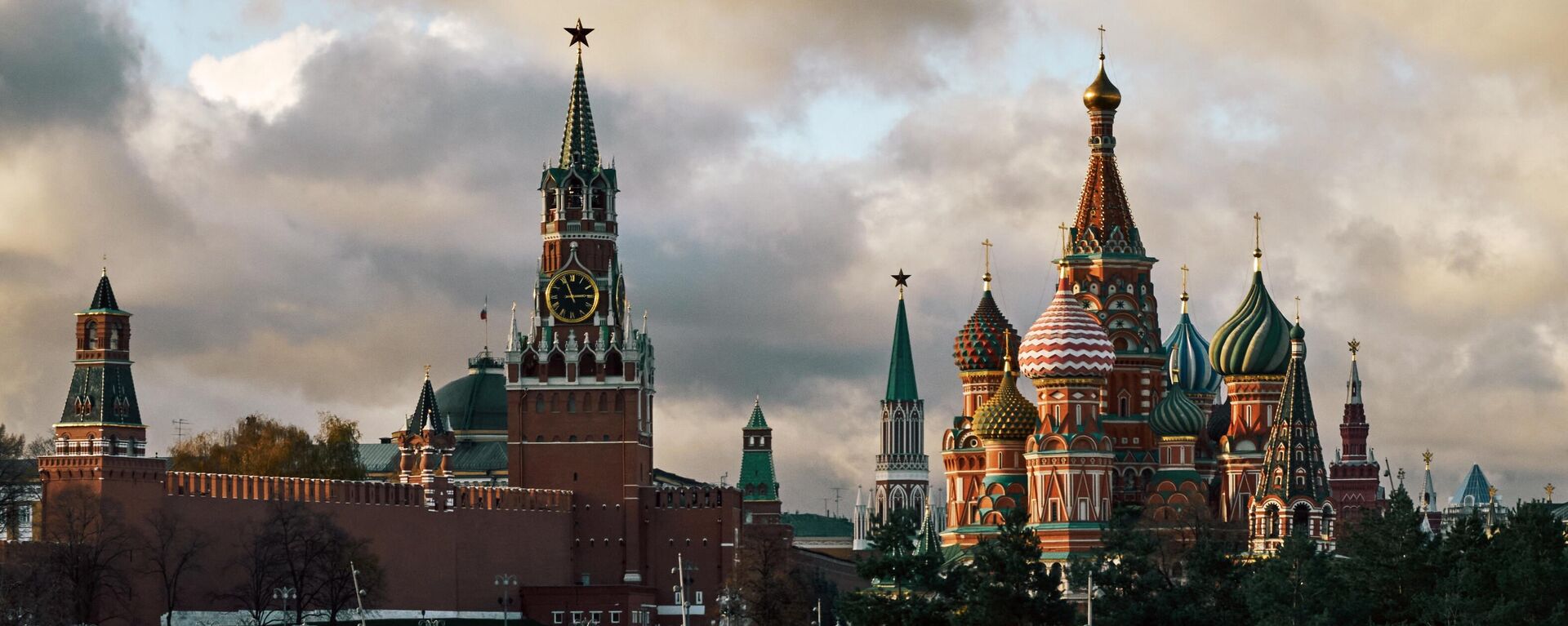https://sputnikglobe.com/20240618/putin-upstages-swiss-summit-with-russian-peace-plan-as-us-german-leaders-bail-1119001613.html
Putin Upstages Swiss Summit With Russian Peace Plan as US, German Leaders Bail
Putin Upstages Swiss Summit With Russian Peace Plan as US, German Leaders Bail
Sputnik International
As Western leaders prepared to gather at Volodymyr Zelensky’s summit on the Ukraine conflict in Switzerland, Russian President Putin preempted negotiations by promoting Moscow’s own peace plan.
2024-06-18T00:55+0000
2024-06-18T00:55+0000
2024-06-18T00:55+0000
analysis
russia
ukraine
nato
russian foreign ministry
mark sleboda
volodymyr zelensky
vladimir putin
ukrainian crisis
ukrainian conflict
https://cdn1.img.sputnikglobe.com/img/07e8/06/0f/1118967532_0:0:3071:1728_1920x0_80_0_0_aea678be06c535f12fd4a267b7ddb3a3.jpg
As Western leaders prepared to gather at President Volodymyr Zelensky’s summit on the Ukraine conflict in Switzerland, Russian President Vladimir Putin preempted negotiations by promoting Moscow’s own peace plan during an address at the Russian Foreign Ministry Friday evening.Putin’s speech at the venue, where he has traditionally offered important statements on foreign policy, restated many of the demands Russia has made dating back to the early days of the country’s special military operation, including the neutrality and demilitarization of the Kiev regime. Putin also reiterated that Moscow views Ukraine’s accession to NATO as an existential threat, insisting Ukraine must abandon attempts to join the anti-Russia bloc.The international relations expert joined hosts Ted Rall and Angie Wong Monday to discuss the implications of Ukraine’s much-derided “peace summit” this weekend at a luxury Swiss resort.The communiqué that emerged from the meeting represented “a watered down version of Zelensky's 'peace formula,' a demand from the losing side of the conflict, a childish demand for Russia's unconditional surrender,” said Sleboda.Wong noted that many countries present at the summit opted not to sign the statement, citing the futility of negotiations that did not include representatives from Russia.“Two of them then withdrew their signatures – Iraq and Jordan,” noted Sleboda. “The countries who signed it were mostly the West and a few client states. That's essentially it.”The analyst said any potential impact of the event was diminished after Putin’s address Friday, undermining Western claims of Russian intransigence. Moscow’s peace formula called for Kiev to withdraw from the Kherson and Zaporozhye regions, which have opted to join Russia via popular referenda, and also continued to demand the denazification of Ukraine.Western countries have continued to downplay the influence of anti-Russia neo-Nazi elements in the country, a problem that was widely acknowledged in mainstream media before Moscow launched its special military operation in Ukraine in 2022.“If this were America in the same situation, the demands would keep escalating, right? ... Americans are dealing with a country that has a different temperament and its politicians have a different temperament than our own, and that's part of the problem why it's difficult to resolve things,” he argued, suggesting the consistent nature of Russia’s requirements for peace undermines Western claims the country is fighting a war of aggression.But Sleboda reiterated that Moscow would not allow Ukraine to persist as an existential threat to the Russian state, noting the country would be forced to continue westward if Kiev is continuously weaponized as an anti-Russia beachhead.
https://sputnikglobe.com/20240617/effectiveness-of-swiss-hosted-summit-on-ukraine-tends-to-zero---kremlin-1118995876.html
russia
ukraine
Sputnik International
feedback@sputniknews.com
+74956456601
MIA „Rossiya Segodnya“
2024
John Miles
https://cdn1.img.sputnikglobe.com/img/07e8/01/19/1116388787_0:0:1316:1316_100x100_80_0_0_77e70d36afd983012b1c5d38ddb84156.jpg
John Miles
https://cdn1.img.sputnikglobe.com/img/07e8/01/19/1116388787_0:0:1316:1316_100x100_80_0_0_77e70d36afd983012b1c5d38ddb84156.jpg
News
en_EN
Sputnik International
feedback@sputniknews.com
+74956456601
MIA „Rossiya Segodnya“
Sputnik International
feedback@sputniknews.com
+74956456601
MIA „Rossiya Segodnya“
John Miles
https://cdn1.img.sputnikglobe.com/img/07e8/01/19/1116388787_0:0:1316:1316_100x100_80_0_0_77e70d36afd983012b1c5d38ddb84156.jpg
volodymyr zelensky summit, summit on the ukraine conflict, swiss peace summit results, russian peace plan on ukraine, russia proposes peace draft for ukraine
volodymyr zelensky summit, summit on the ukraine conflict, swiss peace summit results, russian peace plan on ukraine, russia proposes peace draft for ukraine
Putin Upstages Swiss Summit With Russian Peace Plan as US, German Leaders Bail
Moscow has reiterated its requirements for peace with Ukraine, undermining Western claims of Russian intransigence.
As Western leaders prepared to gather at President Volodymyr Zelensky’s summit on the Ukraine conflict in Switzerland, Russian President Vladimir Putin preempted negotiations by promoting Moscow’s own peace plan during an address at the Russian Foreign Ministry Friday evening.
Putin’s speech at the venue, where he has traditionally offered important statements on foreign policy, restated many of the demands Russia has made dating back to the early days of the country’s special military operation, including the neutrality and demilitarization of the Kiev regime. Putin also reiterated that Moscow views Ukraine’s accession to NATO as an
existential threat, insisting Ukraine must abandon attempts to join the anti-Russia bloc.
“Ukraine must return to neutrality,” said security analyst Mark Sleboda on Sputnik’s The Final Countdown program, summarizing Putin’s address. “It cannot join NATO. It must not try to gain nuclear weapons, and it must respect the rights of Russian speakers and Russian ethnics and other minorities, like Hungarian speakers and so forth, in the country.”
The international relations expert joined hosts Ted Rall and Angie Wong Monday to discuss the implications of Ukraine’s much-derided “peace summit” this weekend at a luxury Swiss resort.
The
communiqué that emerged from the meeting represented “
a watered down version of Zelensky's 'peace formula,' a demand from the losing side of the conflict, a childish demand for Russia's unconditional surrender,” said Sleboda.
Wong noted that many countries present at the summit
opted not to sign the statement, citing the futility of negotiations that did not include representatives from Russia.
“Two of them then withdrew their signatures – Iraq and Jordan,” noted Sleboda. “The countries who signed it were mostly the West and a few client states. That's essentially it.”
“Evidently [US Vice President] Kamala Harris and [German Chancellor] Olaf Scholz – the conference was such an exercise in damage control that they left early,” he continued. “They didn't even stay for the signing, for the crafting or the signing of the statement of this not peace party. They left right after the opening ceremonies and the photo op. So that tells you how important the US and Germany thought the work being done there was.”
The analyst said any potential impact of the event was diminished after
Putin’s address Friday, undermining Western claims of Russian intransigence. Moscow’s peace formula called for Kiev to withdraw from the Kherson and Zaporozhye regions, which have opted to join Russia via popular referenda, and also continued to demand the denazification of Ukraine.
Western countries have continued to downplay the influence of anti-Russia neo-Nazi elements in the country, a problem that was widely
acknowledged in mainstream media before Moscow launched its special military operation in Ukraine in 2022.
“Everytime I listen to Putin's and Russia's demands, what strikes me is that they've been basically the same,” said host Ted Rall. “It's very interesting that even though their military position has improved… with the exception of the two areas that you're mentioning, Kherson and Zaporozhye, pretty much not that much has really changed much.”
“If this were America in the same situation, the demands would keep escalating, right? ... Americans are dealing with a country that has a different temperament and its politicians have a different temperament than our own, and that's part of the problem why it's difficult to resolve things,” he argued, suggesting the consistent nature of Russia’s requirements for peace undermines Western claims the country is fighting a war of aggression.
But Sleboda reiterated that Moscow would not allow Ukraine to persist as an existential threat to the Russian state, noting the country would be forced to continue westward if Kiev is continuously
weaponized as an anti-Russia beachhead.
“This is the last peace proposal by Russia,” he warned. “The next will not even be presented as a negotiation. They will be a set of unconditional surrender terms delivered to the Kiev regime and the West at the end of this conflict.”




